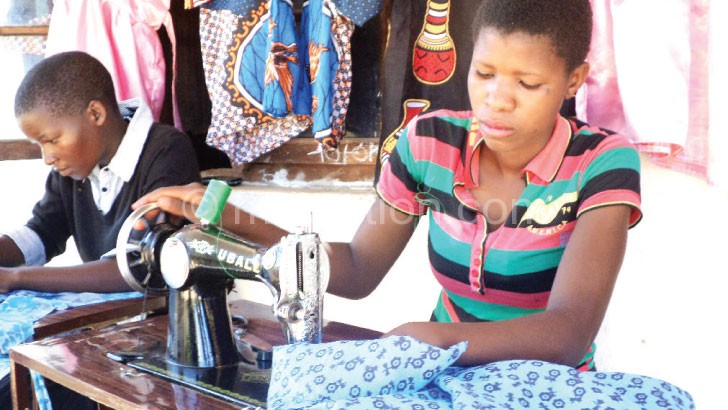Fighting child labour, promoting education
He was engaged in tobacco farming for over three years. In the process, he totally disregarded education. Though, only, 11 then, his parents never thought the work he rendered constituted child labour.
This is Stephano Haston, a 14-year-old Standard Seven pupil at Kampanje Primary School in Khomba Village, Traditional Authority (T/A) Njolomole in Ntcheu.
“I could wake up at 3am and knock off at around 5pm, helping my parents in the tobacco field or doing piecework, particularly herding cattle.
“Each time it was tobacco growing season, I could not report to school. I did not even have time to play as I had to attend to the crop from the nursery, garden and harvesting,” he says.
This is just one example of how children find their rights being exploited.
In Malawi, a child is defined as anyone below 18 years. And Section 23(3) of the Constitution enshrines the need for parents to care for children and protect them from works that affect them psychologically, mentally and physically, including tobacco farming and herding livestock.
But there has always been a thin line between labour that will groom the child into a responsible adult and that which will affect him psychologically, mentally and physically.

“I never knew that involving him in tobacco production is detrimental to his future. I thought this was the way to give him hands-on experience in farming,” says Damiano Mostad, Stephano’s father.
“My family depends on tobacco and cattle for survival. In view of that, I thought it would be better if my child started learning these things from a tender age.”
International Labour Organisation (ILO) Convention 180, which sets guidelines on the minimum legal work for children aged 14 to 17, isolates tobacco farming, herding livestock, child trafficking and prostitution, among others, as tasks the age group should not be involved in.
Following her ratification to ILO Convention 180 in 2010, Malawi developed the National Action Plan to combat child labour.
Stephano’s removal from the tobacco farm is part of interventions by Japan Tobacco International (JTI) Malawi Limited to meet World Trade Organisation’s (WTO) requirements, particularly one that every product on the market should not involve exploitation of children.
JTI Malawi contributes towards attainment of the interventions by funding the Achieving Reduction of Child Labour in Support of Education (Arise) project which is implemented by Circle for Integrated Community Development (Cicod) in Chizungu Village, T/A Ganya, Kamiza Village in T/A Kwataine and Kampanje Village in T/A Njolomole in Ntcheu.
The four-year project seeks to keep 1 080 children away from the tobacco industry. Stephano is one of them.
Tida Saulos, one of the centre coordinators at Chizungu Community Service Outlet in Muso III Village, T/A Ganya, described the project as a step in the right direction. The centre is under the Arise project and offers vocational skills to those who cannot return to school.
Seventeen-year-old Aubrey Kingsley and Moyenda Balani, 16, are some of beneficiries of vocational skills at the centre. Kingsley is learning carpentry and joinery while Balani is learning bricklaying.
Balon Zabula, zone coordinator at Kamiza Community Service Outlet in T/A Kwataine, says the centres also offer Complementary Basic Education (CBE) to enable those learning the vocational skills read, write and calculate.
“Illiteracy levels are expected to drop following interventions under this project. According to government procedure, those who attend CBE for three consecutive years can enrol in Standard Five at any primary school if so they wish,” he says.
Cicod programme manager Christopher Misuku says after identifying victims of child labour, they establish what pushed them into the practice, stressing that poverty and negligence are key causes.
He says the project then provides uniforms and writing materials to children going back to school.
“If we withdraw a child from labour, but the family is in dire poverty, chances are that they will return into child labour, particularly livestock herding. We provide income generating activities to their parents to provide basic needs to the children,” says Misuku.
Group village head (GVH) Kamiza agreed with Misuku, adding that since the beginning of the project, communities respect children rights.
“You cannot see a child working in tobacco farms at any stage of producing the crop. Even herding of livestock is done by parents. Children have to exercise their rights fully, namely learning and playing for their development,” he says.
Ntcheu district education management information systems officer Godfrey Kambankadzanja, who is also the district’s Arise project coordinator, says the project supports government’s National Education Plan (NEP) on access and equity by encouraging children to go back to school.
He says enrolment in primary schools in the targeted areas has also increased, adding that most of the children withdrawn from labour are back in school.
“Pupils’ performance has also improved as children now have enough time doing school work and recreation activities than dividing it between school, recreation activities and tobacco farming or herding cattle,” says Kambankadzanja.





